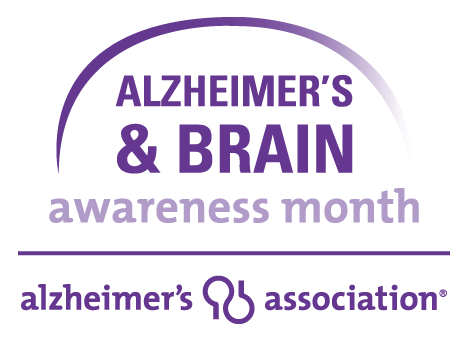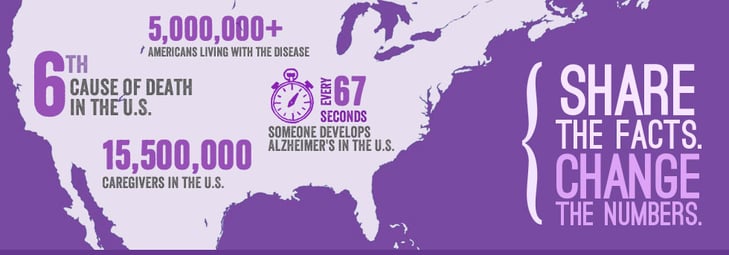 Every November, we mark National Alzheimer’s Disease Awareness Month. It was first designated by President Reagan in 1983 (sadly, Reagan himself succumbed to the ravages of the disease in 2004).
Every November, we mark National Alzheimer’s Disease Awareness Month. It was first designated by President Reagan in 1983 (sadly, Reagan himself succumbed to the ravages of the disease in 2004).
As a memory care provider in Cincinnati, we honor both the month and the millions of families affected by Alzheimer’s and related dementia disorders. Let’s catch you up on the latest dementia studies and their potential findings.
1.) Alzheimer’s may be detectable earlier through recognition of subtle speech changes.
Reagan’s legacy may extend beyond his status as a public figure with Alzheimer’s disease. Interestingly, he may have provided science with clues to earlier detection.
A study published last year in the Journal of Alzheimer’s Disease analyzed footage and transcripts of press conferences gave while President of the United States, then compared the complexity of his speech and logic patterns in the later years of his term to that of his earliest years in office.
Reagan was chosen as a study subject because researchers at Arizona State University recognized that, “he was the only individual with progressive dementia for whom long-term transcript information is publicly available,” according to New York Times contributor Dr. Lawrence K. Altman.
Often, people who have Alzheimer’s don’t receive a confirming diagnosis of the condition before they pass.
The study’s authors found that speech changes indicative of early-onset Alzheimer’s were evident long before Reagan’s first diagnosis came in 1994.
“In Mr. Reagan’s speech, two measures — use of repetitive words, and substituting nonspecific terms like ‘thing’ for specific nouns — increased toward the end of Mr. Reagan’s presidency, compared with its start. A third measure, his use of unique words, declined,” Altman reported.
Given this insight, the study’s authors proposed that similar analytical methods could be developed to detect Alzheimer’s development in other people.
2.) Alzheimer’s may be an even more common cause of death than previously realized.
Although Alzheimer’s is currently ranked as the sixth leading cause of death in the United States, deaths attributable to the disease may be underreported, according to two studies funded in part by the National Institutes of Health (NIH).
Alzheimer’s may in fact rank as high as third in leading causes of stateside mortality. Why the confusion?
Often, people who have Alzheimer’s don’t receive a confirming diagnosis of the condition before they pass. Moreover, in many instances, the official cause of mortality listed on a patient’s death certificate — say, fall-related head trauma or aspiration pneumonia — are complications secondary to the underlying dementia condition.
In other words, researchers found that Alzheimer’s often causes the cause of death.
3.) Your diet may influence your Alzheimer’s risk.
We know that Alzheimer’s disease is common in the United States and other Western countries. But what about in other countries? And are incidence rates changing?
In fact, they are. In 1985, for example, only 1 percent of Japanese citizens had Alzheimer’s disease. By 2008, the rate was 7 percent. Some researchers have long noted the relative prevalence of Alzheimer’s and related dementia disorders in Western societies and wondered if there may be a correlation to an unhealthy diet.
It seems that may be case.
A study published this year in the Journal of the American College of Nutrition looked at typical diet versus dementia incidence across 10 countries (Brazil, Chile, Cuba, Egypt, India, Mongolia, Nigeria, Republic of Korea, Sri Lanka and the United States). It found that there is a markedly increased risk of Alzheimer’s development for people who eat a meat-laden diet.
“The Western dietary pattern — especially the large amount of meat in that diet — is strongly associated with risk of developing Alzheimer’s disease and several other chronic diseases,” wrote the study’s lead researcher, Dr. William B. Grant.
“The traditional Mediterranean diet is associated with about half the risk for Alzheimer’s disease of the Western diet,” Grant reported. “The traditional diets of countries such as India, Japan, and Nigeria, with very low meat consumption, are associated with an additional 50 percent reduction in risk of Alzheimer’s disease.”
More funding is needed for Alzheimer’s disease and cognitive disorder research.
Although efforts to find better treatments for dementia disorders have been ongoing for decades, scientists aren’t anywhere close to finding a cure. With a rapidly aging population, it’s imperative that America do more to combat Alzheimer’s disease.
National Alzheimer’s Disease Awareness Month seeks to draw attention to the scope of the problem. Want to help? Visit the Alzheimer’s Association’s website and find out what you can do. Donate, volunteer, or help to spread the word today.
And, if your loved one is living with dementia, know that there are resources for you — including residential memory care at the Morris Apartments, part of Episcopal Retirement Services’ Marjorie P. Lee Retirement Community — here in Cincinnati.
We’re here to help your family when you need us.
Looking ahead: Conference for CaregiversERS's Parish Health Ministry has planned its annual conference to offer resources and support to caregivers who are supporting a loved one living with Alzheimer’s or dementia. An enhanced regional conference for 2017, "Refresh Your Soul - Alzheimer’s & Dementia: Overcoming the Struggles & Living Inspired," has expanded to become a two-day event devoted to dementia care at Xavier University’s Cintas Center. In partnership with ERS, Xavier University will host the second day’s “Dementia Care Summit.” The conference’s title sponsor is TriHealth.`````
SAVE THE DATE: DAY ONE — PHM REFRESH YOUR SOUL CONFERENCEMonday, March 13, 2017
|













